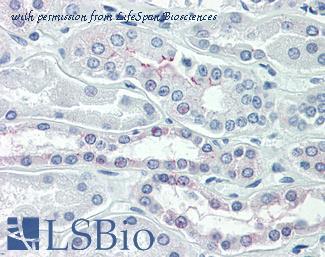product summary
Loading...
company name :
LifeSpan Biosciences
product type :
antibody
product name :
IHC-plus™ OCLN / Occludin Antibody (C-Terminus, clone OC-3F10) LS-B2320
catalog :
LS-B2320
clonality :
monoclonal
host :
mouse
conjugate :
nonconjugated
clone name :
OC-3F10
reactivity :
human
application :
western blot, ELISA, immunohistochemistry, immunocytochemistry, immunohistochemistry - paraffin section
more info or order :
citations: 2
| Published Application/Species/Sample/Dilution | Reference |
|---|---|
| |
image
image 1 :

Anti-Occludin antibody IHC of human kidney. Immunohistochemistry of formalin-fixed, paraffin-embedded tissue after heat-induced antigen retrieval. Antibody concentration 10 ug/ml.
product information
AntibodyID :
82908
AntibodyName :
LS-B2320
TargetSpecies :
Human
Host Species :
Mouse
Product Name :
IHC-plus™ OCLN / Occludin Antibody (C-Terminus, clone OC-3F10) LS-B2320
Specificity :
Recognizes mammalian Occludin Protein. Species cross-reactivity: human, mouse, rat and canine.
ClonalityDesc :
Monoclonal
CloneName :
OC-3F10
AntibodyModification :
Unconjugated
AntigenModification :
C-Terminus
PresentationDesc :
PBS, pH 7.4, 0.09% Sodium Azide
ImmunogenType :
Fusion protein
ImmunogenDesc :
GST fusion protein consisting of the C-Terminus (~150aa) of human occludin.
PurificationDesc :
Protein A purified
RecommendedStorageDesc :
Short term: store at 4°C. Long term: aliquot and store at -20°C. Avoid freeze-thaw cycles.
IsotypeName :
IgG1,k
Gene :
OCLN / Occludin
StandardGeneSymbol :
OCLN
Reactivity :
Mouse, Dog, Rat, Human
Usage :
ELISA (0.1 - 1 µg/ml), IF (2 - 3 µg/ml), IHC, IHC-P (5 - 10 µg/ml), WB (0.1 - 1 µg/ml)
ShortWebDescription :
Occludin antibody LS-B2320 is an unconjugated mouse monoclonal antibody to Occludin (OCLN) (C-Terminus) from human. It is reactive with human, mouse, rat and other species. Validated for ELISA, IF, IHC and WB. Tested on 20 paraffin-embedded human tissues. Cited in 1 publication.
UsageText :
Immunohistochemistry: LS-B2320 was validated for use in immunohistochemistry on a panel of 21 formalin-fixed, paraffin-embedded (FFPE) human tissues after heat induced antigen retrieval in pH 6.0 citrate buffer. After incubation with the primary antibody, slides were incubated with biotinylated secondary antibody, followed by alkaline phosphatase-streptavidin and chromogen. The stained slides were evaluated by a pathologist to confirm staining specificity. The optimal working concentration for LS-B2320 was determined to be 10 ug/ml. Positive control: T84 cell line (human intestinal epithelium), MDCK cells (canine kidney), rat liver and Caco-2 cells (human colon adenocarcinoma). Does not appear to detect the most highly phosphorylated form of the occludin protein when tested on Caco-2 cells.
Synonyms :
OCLN, Occludin, BLCPMG
SalesRegion :
Worldwide
more info or order :
company information

LifeSpan Biosciences
2401 Fourth Avenue, Suite 900
Seattle, WA 98121
Seattle, WA 98121
CustomerSupport@lsbio.com
https://www.lsbio.com1-206-464-1554
headquarters: USA
Since 1995, LifeSpan has been the industry leader in molecular pathology, specializing in the localization of proteins in normal and diseased tissues, both human and non-human. We offer more than 74,000 antibodies, custom designed immunohistochemistry (IHC) studies, immediately available human tissue IHC profiles for more than 500 proteins, and histology and pathology services. Our bank of 2 million specimens is available to support our customers' contract research studies and contains frozen and formalin-fixed (FFPE) normal and diseased tissues. Our contract services are comprehensive; they include study design, antibody sourcing and characterization, tissue sourcing and validation, immunolabeling, trouble shooting, and interpretation of the results by a LifeSpan pathologist.
related products
browse more products
- IHC-plus™ F2RL1 / PAR2 Antibody (N-Terminus, clone SAM11) LS-B2321 | LS-B2321
- IHC-plus™ CCKBR / Cckb Antibody (aa251-266) LS-B2325 | LS-B2325
- IHC-plus™ GCLC Antibody (aa295-313) LS-B2328 | LS-B2328
- IHC-plus™ IDH / Isocitrate Dehydrogenase Antibody LS-B2329 | LS-B2329
- IHC-plus™ ABCC5 / MRP5 Antibody (aa2-13) LS-B2334 | LS-B2334
questions and comments
